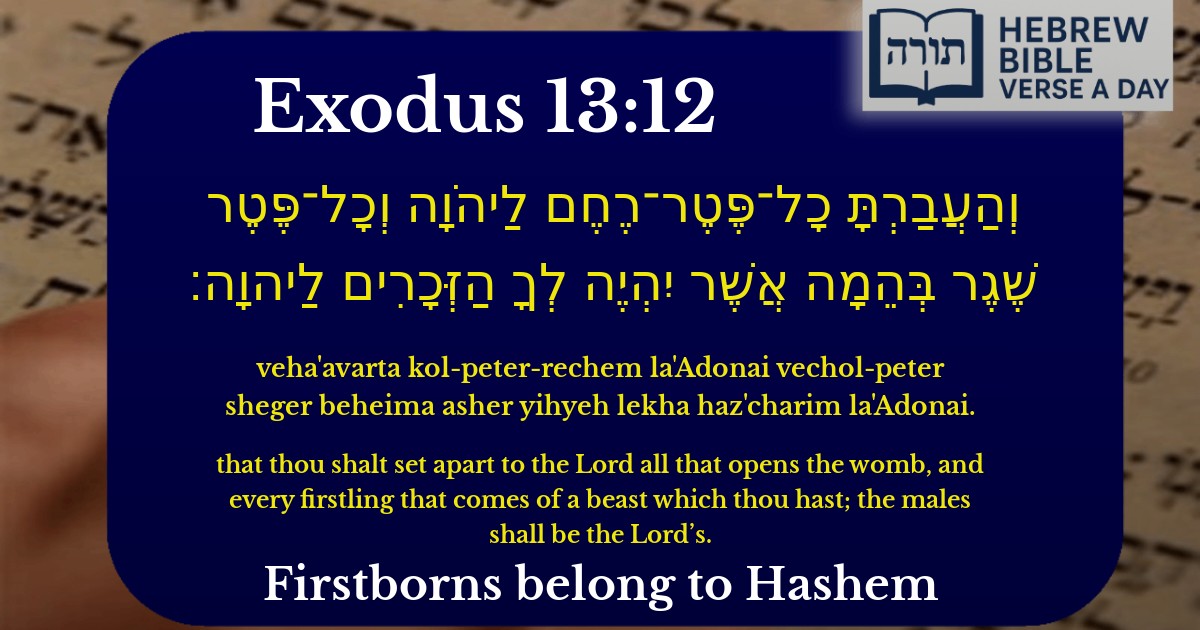Frequently Asked Questions
Q: What does Exodus 13:12 mean?
A: Exodus 13:12 commands the Jewish people to consecrate every firstborn male animal and firstborn human male to Hashem. This mitzvah (commandment) applies to kosher animals (like cattle and sheep) and donkeys (which require redemption with a lamb). Rashi explains that this verse comes after the Exodus from Egypt, where Hashem spared the Jewish firstborns during the Plague of the Firstborn. It serves as a reminder of that miracle.
Q: Why is the firstborn significant in Judaism?
A: The firstborn holds special sanctity (kedusha) because they represent the 'opening of the womb' and were saved during the Exodus. The Rambam (Hilchot Bikkurim) teaches that dedicating the firstborn to Hashem acknowledges that all life comes from Him. Later, the role of serving in the Mishkan (Tabernacle) was given to the Levites instead of the firstborns (after the sin of the Golden Calf), but the concept of their sanctity remains.
Q: How is this mitzvah observed today?
A: Today, we observe this mitzvah in several ways: 1) A firstborn kosher animal (like a cow or sheep) is given to a Kohen (priest). 2) A firstborn donkey is redeemed with a lamb (or its value) given to a Kohen (based on Exodus 13:13). 3) For a firstborn human male, parents perform 'Pidyon HaBen' (redemption of the son) by giving silver coins to a Kohen when the baby is 30 days old (Numbers 18:16). This does not apply if the father or mother is a Kohen or Levi.
Q: What is the deeper lesson of this verse?
A: The Midrash (Shemot Rabbah) teaches that dedicating the firstborn teaches us the principle of 'giving the first and best to Hashem.' Just as farmers bring Bikkurim (first fruits) to the Temple, this mitzvah reminds us to prioritize holiness in our lives. The Sefer HaChinuch (Mitzvah 18) adds that it fosters gratitude—recognizing that our children, livestock, and possessions ultimately belong to Hashem.
Q: Does this mitzvah apply to firstborn girls?
A: No, the verse specifies 'the males shall be Hashem’s' (Exodus 13:12). Rashi clarifies that only firstborn males are sanctified. However, Jewish tradition still celebrates the birth of a firstborn daughter with special joy and blessings. The sanctity of all Jewish life—male and female—is emphasized throughout Torah, but this particular mitzvah applies specifically to males as a remembrance of the Exodus.


Explanation of the Verse
The verse (Exodus 13:12) commands the sanctification of the firstborn, both of humans and animals, to Hashem. This mitzvah is rooted in the Exodus narrative, where Hashem spared the firstborn of Israel during the Plague of the Firstborn in Egypt (Makkas Bechoros). The sanctification of the firstborn serves as an eternal reminder of this divine intervention.
Rashi's Commentary
Rashi explains that the phrase "כָל־פֶּטֶר־רֶחֶם" ("all that opens the womb") refers to the firstborn of both humans and animals. However, the mitzvah applies differently to each:
Rambam's Perspective
In Hilchos Bikkurim (1:1-2), the Rambam elaborates that this mitzvah applies only in Eretz Yisrael and when the majority of Jews reside there. He emphasizes that the sanctity of the firstborn is inherent from birth and cannot be nullified.
Talmudic and Midrashic Insights
The Talmud (Bechoros 4b) discusses the distinction between "פֶּטֶר־רֶחֶם" and "שֶׁגֶר בְּהֵמָה":
The Midrash (Shemos Rabbah 19:5) connects this mitzvah to the broader theme of hakaras hatov (gratitude), as it acknowledges Hashem's role in granting fertility and sustaining life.
Halachic Application
In practice: